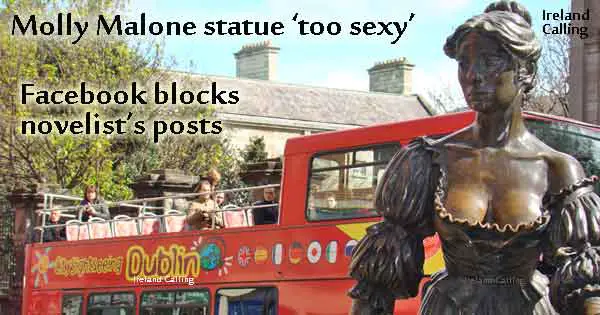Facebook blocked the promotion of a Dublin writer’s debut novel because the front cover features the iconic statue of Molly Malone which the social media giant considered too sexy.
Novelist Frank Whelan posted a picture of the front cover of his book, Diary of the Wolf, on Facebook as a way of raising awareness and creating interest.
However, the post was swiftly blocked by the social media giant because the busty statue was considered unsuitable material.
The iconic statue is one of the most popular attractions in Ireland’s capital. There are thousands of photographs taken of it every week, with tourists posing next to the legendary figure.
Molly Malone is a legendary figure in Dublin. She was reportedly a fishmonger by day, and a prostitute by night. The statue shows her dressed in a low cut seventeenth century dress that shows off her ample bosom and pushing her fish cart.
The statue is sometimes referred to as the ‘Tart with the cart’ or the ‘Trollop with the scallops’ by locals.

The statue is the main picture on the front cover of Whelan’s novel Diary of the Wolf.
The writer explained that shortly after posting the picture, it was blocked and he received the following message from Facebook:
“Your ad was rejected because the image doesn’t follow our ad policies. Ads may not use overly sexual images, suggest nudity, show a lot of skin or cleavage, or focus unnecessarily on specific body parts.”
Whelan said he was initially amused but then realised that the loss of Facebook was a serious blow to his promotions.
He contacted Facebook and pointed out that the statue was an iconic symbol of Dublin.
A spokesperson for Failte Ireland said: “There are probably already thousands of pictures of Molly Malone plastered over Facebook by visitors to Dublin.
“Molly Malone is one of the most photographed statues in Dublin and in all of Europe.
“Rigidly applying such rules would also exclude images of many statues of ancient Greece and Renaissance Europe.”
Fortunately for Whelan, Facebook did review his case and have now allowed the post to be published. They told him: “We always aim to strike a balance between artistic expression and making sure our global community feels comfortable. In reviewing this we made a mistake and quickly restored the advert once it was brought to our attention. We apologise for any inconvenience we caused.”
